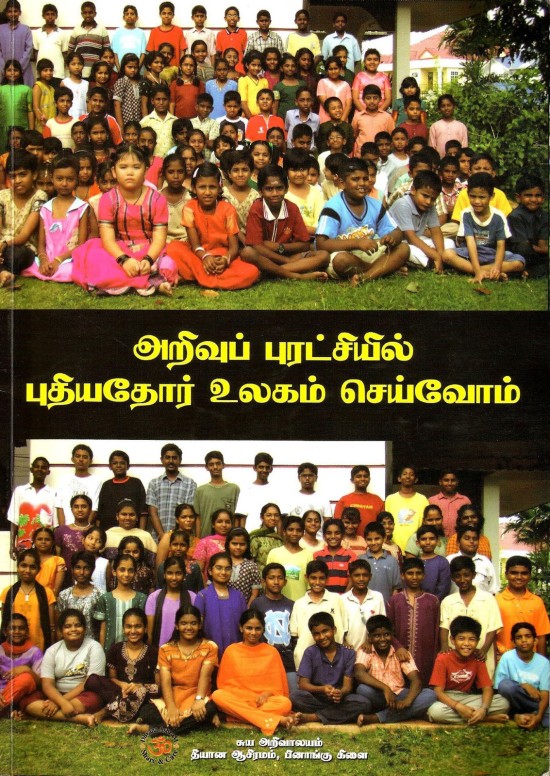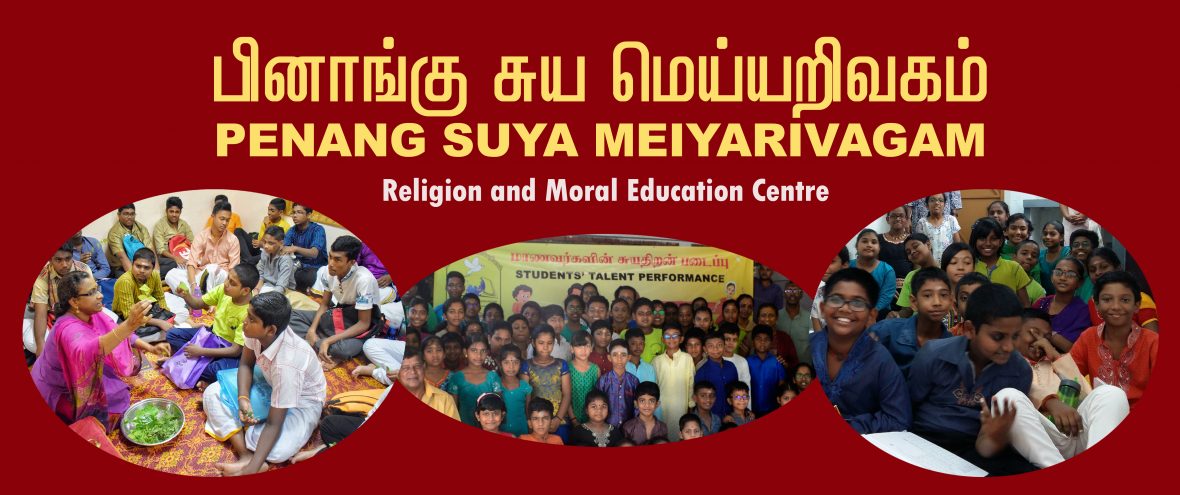PENANG SUYA MEIYARIVAGAM
(Reg.No. PPM-010-07-06082008)
No 9 Jalan Changkat Delima 3, Island Glades,11700, Penang, Malaysia.
INTRODUCTION
Penang Suya Meiyarivagam (PSM) @ Suya Arivaalayam (Persatuan Keilmuan Murni Kendiri Pulau Pinang) is a Non-Government Organization which was started in 1999. Penang Suya Meiyarivagam (PSM) previously known as Suya Arivaalayam, Dhyana Ashram Penang Branch under the advisory of Dhyana Ashram has been functioning with the assistance, support and resource from around 20 volunteers. It is a nonprofit, non-governmental organization registered as a society known as Penang Suya Meiyarivagam (Reg.No. PPM-010-07-06082008) with the Registrar of Societies, Malaysia since 2008.

Booklet published in 2006 about Penang Suya Meiyarivagam’s activities and achievements.
PSM was started with the noble intention to inculcate and inspire moral and spiritual values, social responsibility and holistic development of children, youth and the community as a whole through continuous and sustainable education. Initially, in 1999 the class started with only 30 children and now the enrollment has increased to about 200, comprising children and youth from the age of 6 to 18 from various background and location.
PSM strives to inculcate social values among children and youth to be more socially concerned citizens, counsel and guide students and youth from broken families, develop students’ learning skills, conserve the environment, promote natural healing and organic food, Tamil language competency and spiritual values among younger generation.
VOLUNTEERS
Currently 20 volunteers are conducting various activities to meet the objectives of Penang Suya Meiyarivagam. Some of the volunteers have vast experience in dealing with social issues. The volunteers are from different background such as government staff, lecturers, engineers, teachers, social workers and students of higher learning institutions.
MISSION
To inspire, instill and inculcate the inner divinity, thinking liberality, social responsibility and holistic maturity of an individual.
OBJECTIVE
- Encourage self-redemption: Realize our own impediments, capabilities and
potential for self liberalization. - Pursue self-education: Continuous and untiring crave for self learning and to understand the changing state of the art of our inner self.
- Develop wisdom: Apply the art of living skills to gain the genuine meaning of
knowledge. - Synergize the revelation: Agglutinate the decree of God as the genuine demands of our existence to foresee our future endeavor.
- Inculcate moral standards: Understand and respect for the commandment of nature and respond to the demand of nature appropriately.
- Being in grace: Being conscious of divinity in every existence in the universe.
PEDAGOGICAL PHILOSOPHY FOR LIVING SKILLS CURRICULUM
The content of living skills curriculum is structured based on FORESEER pedagogy which is one of the great invention of our Indian ancestors. FORESEER pedagogy is based on the concept of life centered and education through implementation (by doing). This philosophy is embracing the full range of life experiences and practices of knowledge as an embarkation for the future virtues and wisdom. The learning process of FORESEER pedagogy is informal, edutainment (game centric) and implementation oriented (by doing) in which students are actively involved, contribute, practice and innovate. It is a holistic approach designed to prepare the indulger as a learner, for the various roles which they will be called upon to play now and in the future. This pedagogy will guide the students to be a self-discoverer, self-evaluator and self visionaries of their potential, limitation and social beingness.
The pedagogy of learning method: The Fundamental Livelihood Education Through Implementation
Level by level or Progressive Learning Method : Theory and Practical
Self-Improvisation System
Self-Achievement Evaluative Method
LIVING SKILLS CURRICULUM
It started with the noble aim to inculcate and inspire moral and spiritual values, social responsibility and holistic development of Indian children, youth and the community as a whole through continuous and sustainable living skill education. We have our own systematically developed living skills curriculum as stated here.
1. Tamil Language (Mother Tongue Language)
2. Art of creation (Cognitive Development)
3. Yoga and Meditation (Physical Health)
4. Ecological Education (Environmental Awareness)
5. Siddha Livelihood (Healthy Diet)
6. Agamic Thinking (Humanity, Tradition, and Cultural Education)
7. Teenage Education (Teenage Problem Solving Education)
8. Self Help Counseling (Personality Development Counseling)
which have produced many intelligent and socially responsible youths throughout the 20 years.
We are conducting the curriculum as a kind of school progressive model with self-evaluation and self-achievement progressive report. The curriculum that we are providing is not only supplement to our existing school formal education but as an alternative informal living skill education.
CATEGORIZATION OF CHILDREN
1st level : from the age of 6 to 7
2nd level : from the age of 8 to 9
3rd level: from the age of 10 to 11
4th level: from the age of 12 to 14
5th level: from age of 15 and above
TEACHING METHODS
Focus on the total development of physical, mental, emotional, and spiritual of each individuals.
Encourage the learners to be indulged in research, gathering, experiment, searching, interview, gardening and etc. inline with our mode of theme “Education Through Implementation (Doing)”.
Providing the knowledge, skills and understanding needed by individuals to master their environment. Every learner will be encouraged to self-assess their own performance.
To equip and emphasize the learner with life-relevant competencies in the areas of daily living, social and environmental relationships and community building,
Providing a unified approach to education for life by sustaining rich cultural and spiritual values as a supplementary to formal academic curriculum.
Include basic life education such as self management, personality development, personal financial planning, cultural education, ethics, ecological education, consumer education, living skills, study skills, fine arts, religious study and physical science .
Providing special attention, consultation, counseling and mentoring for the needy and slow learners.
LEARNING OUTCOME
i) To enable a child to realize his or her true capabilities and potential : Encourage
self-redemption
ii) To self-educate and to learn from daily happening through observation and
effective action : Pursue self-education.
iii) To apply and realize knowledge gained from living skill lessons and to ensure
the holistic (physical, mental, emotion and spiritual) development of self : Develop wisdom.
iv) To engage the young children to reveal good values through everyday action in
their life and to be socially responsible and conscious : Synergize the
revelation.
v) To educate the self to understand and respect the law of nature and respond to
the demand of nature in an appropriate manner : Inculcate moral standards.
vi) To help the self to become conscious of the grace of GOD in all existence
(grace) : Being in grace
TRAINING SESSIONS FOR VOLUNTEERS
Series of Training Sessions to upgrade volunteers skills. Train the trainers. From time to time speakers specialized in certain fields such as environmentalists are invited to share their experience. Continuous effort to train the instructors.
PARENTS, TEACHERS AND CHILDREN RELATIONSHIP
Over the years, our volunteers had developed good relationship with parents and children that attend these classes. This rapport has brought together parents to assist and ensure success in large-scale programmes. We have our own parents association to lead, promote, assist and participate in our programs. Some parents even have rendered assistance in providing transport for needy students.
IMPACTIVE PROJECTS
- Exhibition on herbal plants , spices and traditional food for public.
- Health promotion in various places.
- Students’ performance on promoting fine arts and social issues through dramas, songs and dances.
- Herbal Garden for health – there are 70 different types of herbal plants.
- counseling or providing help services like welfare assistance, social security, pensions funds etc for the identified socially poor families.
- Social survey on community development.
- Dialog sessions for parents regarding current social and family problems and providing constructive solutions.
- Counseling and consultation for students and parents with problems – counseling as well as consistent mentoring.
- Students are exposed to nature saving activities through planting trees, recycling, composting and promoting vegetarianism.
- Motivational sessions for school children and adults.
- Special visits and providing services to old folks homes, physically challenged organizations.
- Thevaaram and mantras recital competitions.
- Higher study and Career Guidance for those pursuing higher education like STPM, diploma and degree.
- Workshops on health, environment, study skills and etc.
House Calls – In the past visited low cost flats, an area of poor socio-economy of our surrounding and rendering social welfare support. We have been going from house to house in the surrounding residential area to get children to attend classes and other activities in the centre and give counseling or rendering necessary help for the community based problems such as wife battering, social security, pensions funds etc.
TYPES OF GENERAL ACTIVITIES AT OUR CENTER
- Sangeetham classes – basic and advance
- Mirthangam classes
- Tamil Language classes
- Bharatha Nathiyam classes
- Discourses on Holy Incantation
- Health lectures
- Religious lessons for adults
- Herbal gardening
- Self-defense classes for men and women
- Counseling by professionals
- Yoga for healthy living
- Living skill classes
- Veena classes
REGISTRATION
The class begins in first week of January every year. Students are required to register for the class. A fee of RM 10 charged per student and maximum of RM 20 for two and above number of children from the same family.
